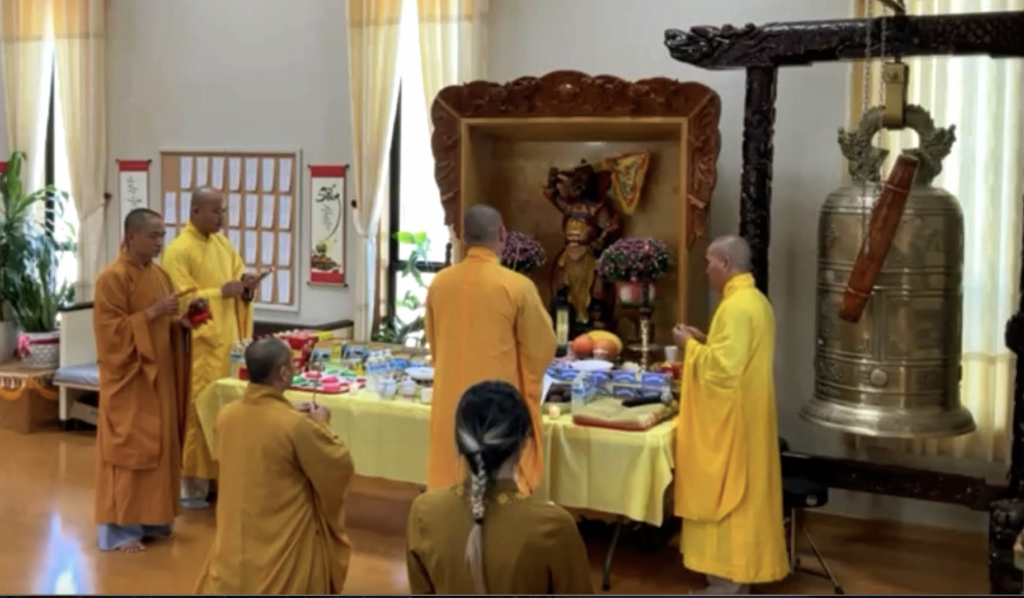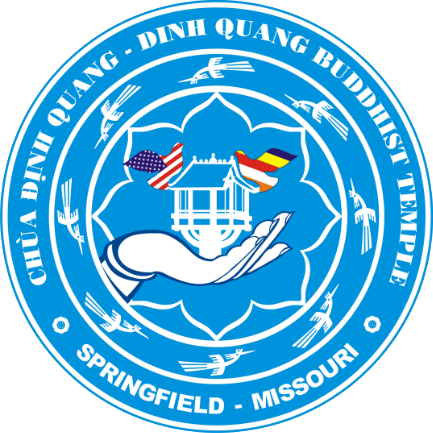Practice is the heart of the Buddhist path, and our community is oriented around practicing with the Buddha’s teachings to cultivate wisdom and compassion. As Thay teaches us, we: “listen a little, practice a lot; listen a little more, practice a lot more.”

Chanting & Meditation Services
Each Sunday morning, we gather for chanting and meditation. English-language services begin at 9 a.m., followed by Vietnamese-language services at approximately 10:30 a.m. The English-speaking community gathers again on Wednesday evenings at 6 p.m. For more information about what to expect when visiting the temple, visit our Newcomer Info page.
Dharma Talks & Dharma Classes
Dharma instruction is offered after each service. Venerable Thay usually offers a Dharma talk in the Buddha Hall after the Vietnamese-language service, at approximately 11:30 a.m.. Giac Vien usually teaches a Dharma Class in the Dharma Hall after each English-language service, at 10:10 a.m. on Sunday mornings and 7:10 p.m. on Wednesday evenings. For more information, visit our Dharma Class page.
Online Options
We currently use Facebook to livestream English-speaking services, as well as holidays and special events. Online participants can join English-speaking Dharma classes using Google Meet. Details, including information on how to join, are shared by email via our Google Group. Additionally, Giac Vien provides a daily practice check-in, Monday through Friday, on YouTube (if the link does not load, try right-clicking and opening in a new tab/window). These short videos include: inviting the bell; reciting a mindfulness training, hearing a Dharma reading, and sharing the merit.
Days of Mindfulness & Retreats
The English-speaking community meets on the third Saturday of each month for a Day of Mindfulness. For those who would like to extend the practice, we have the option to continue in an overnight retreat. As our community grows, we will offer more retreat options. For more information, visit our Days of Mindfulness & Retreats page.
Beginning Anew
Once a quarter, on the fifth Wednesday of the month, our English-speaking service practices gathers to practice Beginning Anew in the context of supporting each other to understand and transform our personal, relational, social, and cultural experiences of uncertainty and suffering. The heart of the service moves through: expressing gratitude and touching the wonders of life; getting in touch with grief, acknowledging hurts we have experienced or witnessed in the world; getting in touch with anxieties and fears, acknowledging those places that need to feel the support of our mindful courage and love; asking for and offering support, providing pathways to transform our suffering into compassion, understanding, and love in action; and naming our aspirations, resolving to live in ways that support awakening in ourselves and all beings. The service can be found beginning on page 30 of our English-speaking service book.
Holiday Celebrations
Dinh Quang Temple celebrates three main festivals each year: Tet, the Lunar New Year, Vesak, commemorating the birth, life, teachings, and parinirvana of the Buddha, and Vu Lan (Ullambana), commemorating parents and ancestors. We also celebrate other holidays commemorating Buddhas, Bodhisattvas, lineage teachers, and special events. The actual date of celebrations at Dinh Quang Temple varies according to our community’s needs. Visiting the temple during these festivals is an especially good way to experience traditional Vietnamese Buddhism, deepen our practices, and build our temple community. For more information, visit our Holidays page.
Spiritual Care
As a community of practice, we support each other to navigate the vicissitudes of aging, illness, and death. Each moment provides an opportunity to cultivate wisdom and compassion, from celebrations (such as weddings and ordinations) to memorials (such as funerals). Please talk to Thay or Giac Vien if you have a specific need.
Socially Engaged Practice
The Buddha’s teachings have always impacted communities, societies, and cultures, including the beautiful bloom of the Bodhisattva path. In the 20th century, Buddhist practitioners sought to apply these wonderful, transformative traditions to multiple crises. We are grateful to inherit these skillful intentions and practices, and to participate in developing and deepening these practices today. For more information and examples, visit our Socially Engaged Buddhism page.
